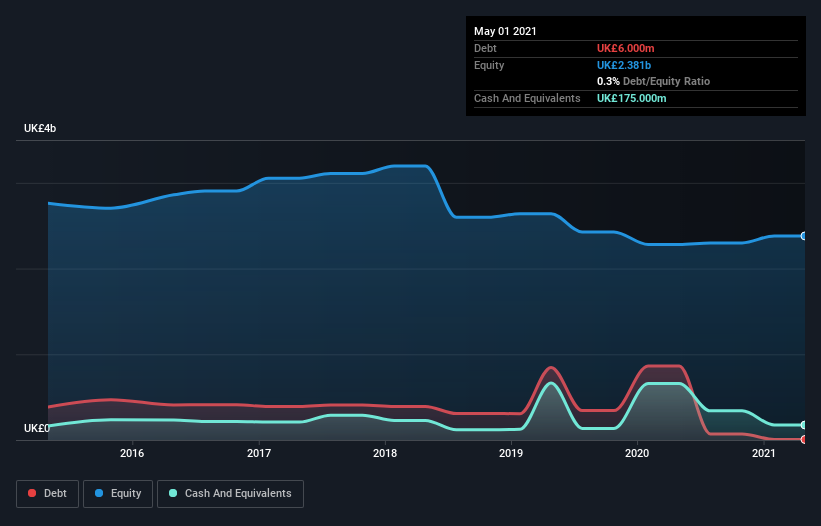Does Dixons Carphone (LON:DC.) Have A Healthy Balance Sheet?
Warren Buffett famously said, 'Volatility is far from synonymous with risk.' It's only natural to consider a company's balance sheet when you examine how risky it is, since debt is often involved when a business collapses. As with many other companies Dixons Carphone plc (LON:DC.) makes use of debt. But should shareholders be worried about its use of debt?
When Is Debt Dangerous?
Debt is a tool to help businesses grow, but if a business is incapable of paying off its lenders, then it exists at their mercy. Part and parcel of capitalism is the process of 'creative destruction' where failed businesses are mercilessly liquidated by their bankers. However, a more usual (but still expensive) situation is where a company must dilute shareholders at a cheap share price simply to get debt under control. Having said that, the most common situation is where a company manages its debt reasonably well - and to its own advantage. The first thing to do when considering how much debt a business uses is to look at its cash and debt together.
See our latest analysis for Dixons Carphone
How Much Debt Does Dixons Carphone Carry?
The image below, which you can click on for greater detail, shows that Dixons Carphone had debt of UK£6.00m at the end of May 2021, a reduction from UK£864.0m over a year. However, it does have UK£175.0m in cash offsetting this, leading to net cash of UK£169.0m.
How Strong Is Dixons Carphone's Balance Sheet?
According to the last reported balance sheet, Dixons Carphone had liabilities of UK£2.62b due within 12 months, and liabilities of UK£1.88b due beyond 12 months. On the other hand, it had cash of UK£175.0m and UK£588.0m worth of receivables due within a year. So it has liabilities totalling UK£3.74b more than its cash and near-term receivables, combined.
This deficit casts a shadow over the UK£1.54b company, like a colossus towering over mere mortals. So we definitely think shareholders need to watch this one closely. After all, Dixons Carphone would likely require a major re-capitalisation if it had to pay its creditors today. Given that Dixons Carphone has more cash than debt, we're pretty confident it can handle its debt, despite the fact that it has a lot of liabilities in total.
We note that Dixons Carphone grew its EBIT by 27% in the last year, and that should make it easier to pay down debt, going forward. When analysing debt levels, the balance sheet is the obvious place to start. But ultimately the future profitability of the business will decide if Dixons Carphone can strengthen its balance sheet over time. So if you want to see what the professionals think, you might find this free report on analyst profit forecasts to be interesting.
But our final consideration is also important, because a company cannot pay debt with paper profits; it needs cold hard cash. Dixons Carphone may have net cash on the balance sheet, but it is still interesting to look at how well the business converts its earnings before interest and tax (EBIT) to free cash flow, because that will influence both its need for, and its capacity to manage debt. Over the last three years, Dixons Carphone actually produced more free cash flow than EBIT. That sort of strong cash generation warms our hearts like a puppy in a bumblebee suit.
Summing up
Although Dixons Carphone's balance sheet isn't particularly strong, due to the total liabilities, it is clearly positive to see that it has net cash of UK£169.0m. The cherry on top was that in converted 153% of that EBIT to free cash flow, bringing in UK£722m. So we don't have any problem with Dixons Carphone's use of debt. Even though Dixons Carphone lost money on the bottom line, its positive EBIT suggests the business itself has potential. So you might want to check out how earnings have been trending over the last few years.
When all is said and done, sometimes its easier to focus on companies that don't even need debt. Readers can access a list of growth stocks with zero net debt 100% free, right now.
This article by Simply Wall St is general in nature. It does not constitute a recommendation to buy or sell any stock, and does not take account of your objectives, or your financial situation. We aim to bring you long-term focused analysis driven by fundamental data. Note that our analysis may not factor in the latest price-sensitive company announcements or qualitative material. Simply Wall St has no position in any stocks mentioned.
Have feedback on this article? Concerned about the content? Get in touch with us directly. Alternatively, email editorial-team (at) simplywallst.com.

 Yahoo Finance
Yahoo Finance 
